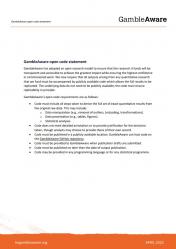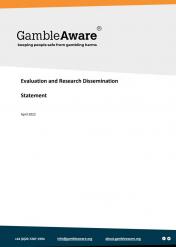New research sheds light on drivers for gambling and associated harms amongst women in Britain
GambleAware has today published research in partnership with IFF Research, the University of Bristol, and Gamcare, revealing new insights about British women and gambling.
Research commissioned by GambleAware has revealed new insights about British women and gambling, including the drivers that often lead them to experience gambling harms.
Published in a report released today, the research – which was conducted by IFF Research and University of Bristol with expert advice from GamCare – found that the main drivers of gambling among women in Britain are:
- Psychological drivers: including seeking positive emotions - which many women described as “the buzz” or “the thrill” - or using gambling as a mental escape to try to avoid negative emotions such as stress or boredom.
- Social drivers: partaking in gambling to help develop and maintain relationships with friends, acquaintances, family and colleagues.
- Financial drivers: the idea of winning money, often in an attempt to boost household finances and to relieve financial pressures, or to provide hope of escape from relationships, poverty, or domestic abuse.
- Industry practices and the role that marketing and advertising plays: Strategies such as gendered advertising, including using female celebrity endorsement, or targeted campaigns aimed at different groups of women, prompt women who already gamble to continue, gamble more often, or try new gambling products. One of the main recommendations from the report is for more research to be commissioned to examine these links between advertising and gambling harm.
While men are widely perceived as more likely to gamble than women, this report examined a range of participation data and confirmed previous findings that the gender gap may be narrowing1. However, the research found that many women do not recognise their activity as ‘gambling’, because few used the term, “gambling” for their activities. Instead, they used language that described either the specific activity, such as “getting my free spins” and “placing a bet”, or they used language which described the occasion; for example, “going to the bingo”. This use of different language often led to the perception that what they were doing wasn’t gambling and was a key reason why many did not recognise they could be gambling in potentially harmful ways, even though there were signs that this was the case.
The report makes several recommendations to better support women experiencing gambling harms, including more gender-specific services that offer comprehensive support for women experiencing gambling harms and other overlapping issues such as poor mental health, financial issues or domestic violence. Another recommendation is for more services to offer support for affected others – who are at risk of harm from someone else’s gambling - as women are also more likely to be an affected other than men2.
Anna Hargrave, GambleAware Chief Commissioning Officer, said: “There has been limited research previously carried out into women’s experience of gambling. However, participation in gambling among women and the rate of women experiencing gambling harms is increasing more quickly, so we felt it was essential to carry out this research to explore the lived experiences of women and their relationships with gambling.
“The research shows the drivers for gambling amongst women, which may lead to them unfortunately experiencing gambling harms, and demonstrates that there are many factors driving women to gamble more. We were particularly concerned by the effect marketing and advertising is having. We will consider the report’s findings and recommendations with interest, to see how it can help benefit our commissioning activity.”
Jo Mustafa, 37, who lives in Luton and is in recovery from gambling harms, said: “My gambling began about seven years ago after I won a one-off bet on a football match with my stepdad. From that day, it escalated - especially once I discovered online slot games - and I was completely drawn in.
“Three years ago, I reached out to Gordon Moody, part of the National Gambling Support Network, who brought me onto their women’s programme. I really appreciated being on a programme designed specifically for women’s needs, and meeting other women who had been in a similar situation to me and shared similar experiences. I feel it helped me open up more and feel comfortable. I hope that more female-focused services like that can be made available to make sure women get the support they need.”
Kelsey Beninger, Director, IFF Research, said: “We are excited to share the findings from this extensive piece of research. Through research like this, we can learn more about what women need and how treatment and support services can give the most effective help to women, tailored for their experiences.”
Professor Sharon Collard, from the University of Bristol, said: "Research shows that women can experience gambling and gambling harms in different ways from men, especially in relation to the types of gambling they participate in, their motivations for doing so and the pathways into harm. Our research looked at this in more detail among women in Britain. We felt it was important to collaborate on this research as much of the evidence base on gambling harm is about men’s experiences, and we want to ensure that women’s experiences are heard and acted upon.”
Laura Burke, GamCare Women’s Programme Manager, said: “At GamCare, we know that women can often face additional barriers in accessing support for gambling harms. Last year, 30 per cent of callers to our National Gambling Helpline were women. This is why this research is important to help us continue building understanding of the unique challenges women face when it comes to gambling harm, and how we can increasingly tailor our support services around them.”
--------------- ENDS ------------
Notes to Editor
1. A survey from the Gambling Commission in 2022 found that, when respondents who only gambled on the National Lottery were excluded, the figures for men and women were 31.3% of men and 27.2% of women had participated in at least one form of gambling “in the past four weeks”.
2. Women with lived experience and experts interviewed for the report identified several recommendations to inform future support for women.
3. The findings from the research are based on online workshops, interviews and focus groups which took place with women from around Great Britain who gamble, and also affected others – women who have been affected by someone else’s gambling. GambleAware commissioned the research to build knowledge of the lived experiences of women in relation to gambling, to inform delivery of their Organisation and Commissioning Strategy.

